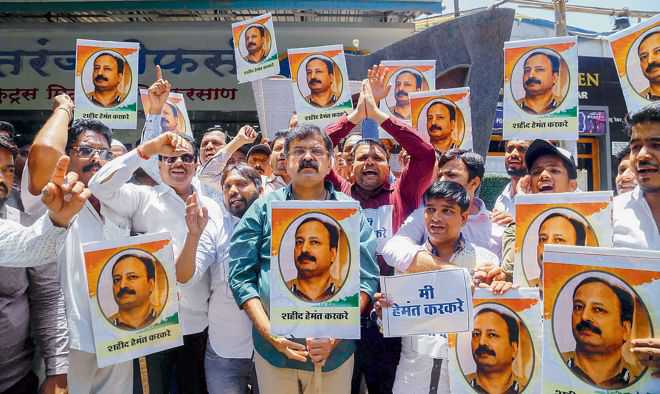
A job done well: Karkare’s contribution to professional policing restored the trust of victims in the rule of law and lent legitimacy to governance.
VIKASH NARAIN RAI
Former director, National Police Academy, Hyderabad
What does the ongoing public spat signify, pitting the electoral presence of Hindutva icon Pragya Thakur against the professional memory of martyred IPS hero Hemant Karkare? The context of the 26/11 Mumbai attack gives an edge to Karkare, whereas his handling of the Malegaon blast probe continues to be a tightrope walk in contrast to bhagwa righteousness of Pragya’s advocates. Ironically, Karkare was never awarded for his Malegaon breakthrough; rather those who destroyed his line of investigation have harvested a bonanza of service extensions and post-retirement positions. It mirrors the impact of political signals in shaping the familiar policing response of going soft on hard-hitting Hindutva vigilantism. It came to Karkare’s lot to unmask such a phenomenon in the last months of his life. Pragya’s candidature, a calculated insult to his memory, is proving that point.
There are reasons why Karkare would be acknowledged a martyr for paying with his life while combating the Pakistan-sponsored terror attack in Mumbai in 2008. He died leading from the front and needs no certificate of martyrdom from any quarter, having shown professional determination in pursuing the leads uncovered in the 2008 Malegaon bombings. On the other hand, Pragya and others are still facing trial, in spite of the NIA being manipulated to get them discharged through a supplementary chargesheet in May 2016 on the plea that there were lacunae in the evidence. Fortunately, this time the trial court declined to endorse it.
Karkare, on return to Maharashtra after his deputation with RAW, took over as the Mumbai ATS chief in January 2008, in which capacity he inherited the case of the Malegaon bombings of 2006 from his predecessor KP Raghuvanshi. The case holds the key to understanding the awkward way the police had initially responded to a series of terror cases against Muslim targets in an era dominated by the threat of radical Islamist organisation SIMI. It was banned in 2001, shortly after the 9/11 attack in the US, but its continued activities appeared regularly on the radar of intelligence agencies. The course of progression of the Malegaon 2006 case is also conclusive of the fact that the ATS under Karkare moved against Pragya and Abhinav Bharat (Hindu militant group of Colonel Purohit) members on the basis of solid evidence much later, unearthed in the phase two Malegaon bombings that occurred in 2008. What proved most crucial was the linking of Pragya’s motorcycle with the crime; she could be linked to the 2006 bombings and subsequent terror cases only after this.
The 2006 bombings were a series of blasts that took place in Malegaon, a town in Nashik district. The ATS initially blamed the bombings on SIMI, but a chargesheet filed by the NIA in 2013 put the blame on Abhinav Bharat. On April 25, 2016, the NIA court found the initial ATS charges to be fabricated and released the nine Muslims previously arrested. The explosions which resulted in 40 fatalities took place in a Muslim cemetery, adjacent to a mosque, after Friday prayers. Most victims were Muslim pilgrims. A curfew was imposed and state paramilitary forces were deployed in sensitive areas. The above pattern of crime targeting Muslims was to be thrice repeated by the Abhinav Bharat gang at large in the following year, by way of Samjhauta Express blast at Panipat (February 2007), Mecca Masjid blast at Hyderabad (May 2007) and Ajmer Sharif blast (October 2007). The police and affected peoples’ response, barring in the Samjhauta Express case, had followed the pattern of Malegaon-2006.
Amidst the signs of a quick breakthrough by Karkare’s ATS in Malegaon (2008), I had a chat with him over the phone from my office in Madhuban, Karnal. He sounded stressed and was reluctant to share specific details. But whatever I learnt from him was professionally rewarding. An SIT had been created under me to investigate the Samjhauta case. We initially carried out the investigation on the assumption of involvement of a Muslim terror organisation, with an agenda to derail Indo-Pak talks. However, we recovered an unexploded device from the train and its components could be traced back to their sources. An extensive research established Indore as the epicentre of the crime and pointed to the involvement of some Hindutva extremist group.
In the meanwhile, a principal suspect and RSS man, Sunil Joshi, had been murdered in 2007 by his own associates. Pragya Thakur was going to be indicted in the murder case as the chief conspirator by the Madhya Pradesh Police. It could move forward only due to Karkare’s breakthroughs. There was course correction in finalising the Mecca Masjid and Ajmer Sharif cases too. Herein is the crux of Karkare’s contribution to professional policing against the menace of organised vigilantism. It restored the trust of victims in the rule of law and lent legitimacy to governance.
Cutting across individual prejudices, the police fraternity as well as other bureaucratic echelons have saluted Karkare’s sacrifice. They have condemned Pragya’s ‘despicable’ remarks on Karkare in her election speeches. Even the BJP, which has fielded her in the fray, seems to have backtracked as far as respecting the martyrdom of Karkare is concerned. Would it not be befitting to pay a tribute to his professionalism by extending the scope of these well-meaning interventions to question the NIA’s complicity? How long will they run without accountability a regime of not producing best evidence and not preferring appeals against engineered acquittals?



























